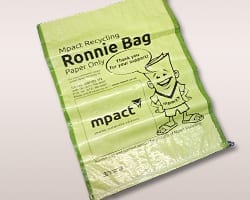South Africa’s National Waste Management Strategy aims to see all South African households in the country’s major centres separating household waste by 2016. As the nation gears up for this year’s Clean-up Week, 14 – 20 September, and Recycle Day, 18 September, paper and plastics recycling group, Mpact Recycling is challenging all South Africans to play their part in keeping the country clean 365 days a year. It’s never been easier getting into the routine of recycling.
The growing culture of recycling continues to have a positive effect on poverty alleviation, enterprise development as well as economic growth. Further, there is the added environmental benefit of preventing tons of waste from going into landfill sites. Good habits Although work still needs to be done in shifting consumer mind-sets, the average person can contribute considerably towards the push to going green by adhering to recycling practises in their immediate environment. A CSIR study revealed that as much as a quarter of all the municipal waste generated in South Africa comprises mainline recyclables such as glass, paper, cans and plastics. The disposal of these recyclables as municipal waste is compromising the lifespan of the country’s landfills, many of which are running out of space.Everyone should be sorting household, school and office waste into paper, plastic, glass, cans and other. This can easily be done by having different coloured or marked containers and by sorting each day as these items are discarded. The balance of the waste goes into the traditional refuse bin for municipal collections.
Helpful tips If you are looking at being greener around the home, there are a few simple tips that any household can follow:- Keep waste paper clean and dry, as quality is important for a good end product
- Check to see if Mpact Recycling offers kerbside collections in your area. In the green Ronnie bag that Mpact Recycling provides to over 200 000 homes in Ekurhuleni, City of Johannesburg and City of Tshwane, you can discard newspaper, magazines, catalogues, phone books, old mail, computer paper, envelopes, gift wrapping paper, cardboard, food boxes, shoeboxes, paper towel and toilet paper tubes, as well as paper egg cartons and other forms of paper or board packaging
- Alternatively, the waste paper can also be dropped off at any of the 2 000 Ronnie Banks conveniently located countrywide at schools, communities and churches







